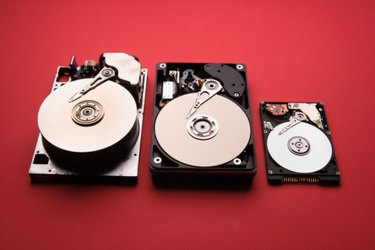
Computer disks include floppy disks, compact discs and hard disks. Although they are not normally harmful when disposed of with normal household waste, computer disks can contain information such as bank details that could be used to commit identity theft. Personal letters and journals stored on disk can also contain sensitive data. Proper disposal of disks is necessary to prevent this information from falling into the wrong hands.
Floppy Disks
Floppy disks consist of a flexible disk of plastic film covered with iron oxide. This is housed in a rigid plastic shell to protect it from damage. A sliding metal cover allows a reader to access the disk when it is in the the floppy disk drive. These disks are easily destroyed by removing the metal cover and cutting or tearing the plastic disk inside. The disk can then be thrown away.
Video of the Day
CD-ROMs
CD-ROMs are made up of a thin layer of metal sandwiched between layers of plastic. Data is encoded in digital form on the metal layer. CD-ROMs can be snapped, bent, scored with a sharp blade or drilled to render their data unrecoverable.
Hard Drives
Hard disks store data on a metal platter. They can be wiped using specialized software designed to destroy the data completely. Hard disks can also be erased using a degausser: a device that generates a magnetic field that completely rearranges the magnetic particles encoding the data, destroying it permanently. Data can also be made non-recoverable by drilling all the way through the hard disk. For complete security, the disk should be drilled in several places.
Disposal
Once disks have been made unrecoverable they can be thrown away. While all kinds of disks can be thrown away with ordinary waste, they contain many elements that can be recycled. Specialist recycling companies exist to make use of disks. Alternatively, disks can be used in various craft and technology projects. Broken CD-ROMs can be turned into mobiles, bird scarers and tesserae for contemporary mosaics. The metal platters from hard disks can be used to make generators and speakers -- as they are magnetic -- as well as clock faces and even wind chimes.